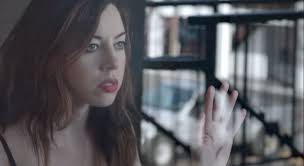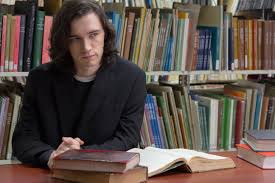Filmmakers and Their Global Lens: Hal Hartley

In this series NYC film-journalist, Dana Knight speaks with filmmakers about their work in the context of the wider world
In the second edition of our new series, Filmmakers and Their Global Lens, The Independent’s special contributor Dana Knight speaks with the filmmaker behind the films Henry Fool and Fay Grim. Dana initially spoke with Hal Hartley, about his latest work, Ned Rifle at the Toronto International Film Festival 2014.
Dana Knight (DK): You’re known for very serious and deeply philosophical works but what’s striking is the intrusion of a certain kind of irony and parodic elements that subvert the seriousness of your films. I would call that a post-modern sensibility, would you agree to that?
Hal Hartley: Probably, yes. I think of it as funny, it’s funny to contrast seriousness with fairly simple comedy.
DK: How did you develop this style of filmmaking that is so unique and was there from your very first film?
Hartley I think it was in my very first film, yes. I think it comes from listening to my family as a child, my aunts and uncles and mum and dad, there is an oral story-telling and singing culture, they’re Irish and English people who came here from Canada. They’d sit around the table drinking and saying funny things, telling stories to each other and there was an irony in there. By the time I got to film school and I actually started writing, my teachers pointed that out, they said “you have a particularly sad and optimistic voice”.
DK: Sad and optimistic at the same time, this is a paradoxical statement…
Hartley I guess so. But they told me to run with that. I like contradiction.
DK: Regarding your very unique cinematic language, how do you make all the aesthetic decisions that go into a film like Ned Rifle and basically all your films?I’m talking about colour, framing…
Hartley That’s how I started making films. In fact the school I went to didn’t require that we choose a major. We were filmmakers, so we had to learn how to record sound, how to work the camera, how to learn about exposure. We had a lot of writing, we had to edit our own films, we were encouraged to think of filmmaking as an art, plain and simple. As a craft as well because all art entails craft but not all craft is art. They were interested in helping us find jobs too, I guess […] And I always had this idea, that everything should come together. It makes me angry almost when I’m watching films and I see something hanging, that’s an aesthetic gesture that doesn’t have anything to do with anything else. I’m always looking on different levels for how everything coheres.
DK: So you don’t like loose narratives.
Hartley Usually not. But it’s not always about narrativity. I gravitate towards fiction because I see fiction as a very specific thing. And my examples for that came mostly from novels, I’m much more dependent on novels than movies or theatre for that. It always shocked me in the 80s when I was very enthusiastic about what Godard was doing in the 60s and all through the 80s and someone would say: “But that’s kind of non-narrative and loosely-structured”. And I’d go: “No way, this is the most tight art”. He was amazingly good, whether he had tiny bits of money or a lot of money. So everything has to come together, and in his films it does, with the framing and the sound he’s using […]. I don’t know where this comes from except this self-education aesthetically, growing up listening to certain rock music and classical music, and looking at paintings and reading a lot, and being able to put your finger on the thing that’s not woven in well, that’s just there for a happy ending. I remember early on in my career, I hated all these films that were almost perfect until the last ten minutes, when there was this totally ridiculous ending put on because God forbid there be a sad ending.
DK: Or a less than totally surprising ending!
Hartley Right. Or no explosions!
DK: On the same note, keeping in mind that the tightly-plotted narrative is considered to be a Hollywood trademark, I was wondering if plot is only a pretext for you, like for many other independent filmmakers…
Hartley No, it’s not a pretext, like I said everything has to work together, dialogue, color, framing, sound, editing, pace. But I think I’m representative of a certain type of American filmmaker of my generation, who’s equally influenced by classical Hollywood films of the 30s and 40s as well as the French New Wave.
DK: And you seem to be able to perfectly combine those, which is a delicate balance to achieve…
Hartley: I hope so. That was kind of conscious.
DK: Your dialogues are very dense and there’s a theatricality to them, can you comment on this?
Hartley Sometimes the films can be dense, yes. Fay Grim, The Girl from Monday, these are dense, they are organised to be dense. They are very clear but they insist that you experience them more than once. Because there is a shape there and the better you get to know the shape, the more aesthetic joy you’ll experience.
DK: Can you talk about your writing process?How long does it take to write a script in general, how many rewrites do you do?
Hartley: A lot. It’s been many years since I’ve just sat down and worked on one script for a whole draft. I do a lot, I’m a multi-tasker, I run my company myself, I have many projects going at any one time.
DK: How do you keep organised?
Hartley: Yeah I know!It’s tough and it’s going to be tougher. Well, I guess I am organised, somewhere along the line I acquired the skills to organise myself and put things in boxes like: Tuesday, that’s it, I’m writing on Tuesday. And Wednesday and Thursday I’m going to take care of business. But sometimes when a piece of writing is getting really hot, it’s really coming together, it might be weeks, months of a few days a week writing and good ideas come and it really starts to smolder. And then I have to turn everything off, I just work for two, three days straight. And hope that I have something. And then I always let it sit aside for a while. Ned Rifle was like that, I let it sit for about six months. And then came back to it and it improved a lot.
 DK: I really liked the line of dialogue in Ned Rifle when a character says that for an artist “being unpopular is a necessity”.
DK: I really liked the line of dialogue in Ned Rifle when a character says that for an artist “being unpopular is a necessity”.
Hartley: I love that conversation. And what I also love about that conversation is the mutual respect that we managed to articulate. Which is important to me in the writing stage. And what I mean by that is that he ddoesn’ttake offence in that remark.
DK: I imagined this character to be a porte-parole for your own vision of the independent filmmaker.
Hartley: A little. I’m not in a position to be willfully unpopular, I can’t make films unless people want to see them. But that’s a zone that artists get into, that a lot of people don’t appreciate.
DK: You’re very well-known to an art crowd audience. Your films are probably too deep, too dense and too philosophical for the mainstream.
Hartley: Yeah. And I’ve never intended to go to the mainstream. Sometimes I kind of came close by accident, but that was never really my intention.
DK: I’m very curious about your work with the actors, they return to your films all the time.
Hartley: Actors [who] have a good time working with me…And I think this group really do, because they’ve been working with me for a long time. They know that it’s about the rhythm of the dialogue and the rhythm of the physical activity, they have to inform each other, they have to rhyme. And that has to be found pretty much when you’re on set. A lot of skill goes into leading them in the right direction. I don’t always have a specific idea but sometimes I do. And Parker is the perfect example of the kind of actor who gets that. She can turn the rhythm of the dialogue into physical activity and vice-versa the way I like. In this case it worked out perfectly because for Aubrey and Liam, who are younger and haven’t worked with me as much, it was all new to them. So it took them a little bit to adjust and learn how to get into that but they did.
DK: So did Aubrey and Liam simply pick up this kind of theatrical, stylized way of acting on the set?
Hartley: I don’t think of it as theatrical. It’s technique and it’s movement and you have to remember the frame. They had to get comfortable with me giving them physical activity that doesn’t make logical sense for their character. That’s the real leap, once they can do that, then their own creativity is brought forth.
Ned Rifle was shown recently at TIFF 2014. In the next interview for the Filmmakers with a Global Lens Series Dana Knight speaks to the creators of E-Team, Ross Kauffman & Katy Chevigny.
Regions: United States
